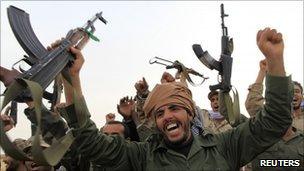Libya crisis: Gaddafi army 'not at breaking point'
- Published

Libya leader Muammar Gaddafi's armed forces are not close to breaking point despite hundreds of allied air strikes, American military chiefs have said.
Adm Mike Mullen told a US Congress committee Col Gaddafi's troops still had 10 times the rebels' firepower.
At the same hearing, Defence Secretary Robert Gates reiterated the US would put no "boots on the ground" in Libya.
Rebels and pro-Gaddafi forces appear to have reached a stalemate in their fight for control of the country.
In recent days, rebels have been urging international forces to conduct more air strikes.
Adm Mullen told the House of Representatives armed forces committee that bad weather had stopped them from identifying targets over the past three or four days.
"[The weather] has more than anything else reduced the impact... reduced the effectiveness, and has allowed the regime forces to move back to the east," the AFP news agency quoted him as saying.
Despite the weather, he said the air strikes since the beginning of the operation had wiped out between 20% and 25% of Col Gaddafi's forces.
"We have actually fairly seriously degraded his military capabilities. That does not mean he's about to break, from a military standpoint, because that's not the case," he said.
Lockerbie link?
Meanwhile, the Gaddafi regime has been reeling from several political setbacks.
The man designated to be Libya's next UN envoy announced he would not take up the post, according to a statement given to media organisations.
Ali Abdessalam Treki, chosen to replace a previous envoy who defected, was quoted as condemning the "shedding of blood".
And Foreign Minister Moussa Koussa fled to the UK on Wednesday, with British officials saying he had quit his post.
Scottish prosecutors say they have made a formal request to interview Mr Koussa over the bombing of a jumbo jet above the town of Lockerbie in 1988.
He was head of Libya's foreign intelligence at the time of the attack, which left 270 people dead. Many of those killed were Americans.
The BBC's John Simpson in Tripoli says there is speculation about the whereabouts of a number of other senior ministers, including the prime minister, speaker of parliament, oil minister, intelligence minister and Mr Koussa's deputy as foreign minister.
A government spokesman told a press conference they were all in Libya, but then also said it was possible some had left the country on a mission.
Meanwhile, the debate is still raging in Western capitals about how much help the rebels can be given under the terms of the UN's resolution, which charged international forces with policing a no-fly zone and arms embargo.
In his testimony to the armed forces committee, Mr Gates said the US would limit its contribution to providing capabilities other nations could not - such as "electronic warfare", aerial refuelling and intelligence.
"Deposing the Gaddafi regime, as welcome as that eventuality would be, is not part of the military mission," he said.
Mr Gates was later quoted by Reuters news agency as saying he was "preoccupied with avoiding mission creep".
He declined to comment on reports that the government had approved CIA deployments in Libya.
Nato, which took sole command of international air operations over Libya on Thursday, said it was strongly opposed to arming the rebels.
Civilian casualties probed
The frontline of fighting has ebbed and flowed on the outskirts of Brega, a town about 800km (500 miles) east of Tripoli that has changed hands repeatedly during days of clashes.
Rebels had entered the town early on Thursday, but were soon chased out as pro-Gaddafi forces fired shells.
By the end of the day it was unclear if anyone was in control of the town, with reports saying rebels were preparing to launch yet another assault.
Further west, pro-Gaddafi forces continued to pound the besieged city of Misrata with artillery and tank fire.
"If it continues for a couple more days, I'm afraid it will overwhelm the city and it will be a complete massacre," a resident told the BBC.
Nato said it was investigating reports of civilian casualties in Western air strikes on Tripoli.
Earlier, the top Vatican official in the Libyan capital, citing witnesses, said 40 civilians had been killed in strikes by Western forces on the city.
The uprising against Col Gaddafi's regime began in mid-February, with protesters spurred on by the ousting of neighbouring long-time rulers in Tunisia and Egypt.